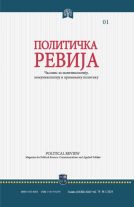- Home page
- Researchers
- Veljko Samardžić
Veljko Samardžić
Higher Vocational School for Entrepreneurship

LANGUAGE IMPEDIMENTS TO ECONOMIC DEVELOPMENT OF SERBIAN COMMUNITIES IN KOSOVO AND METOHIJA
Economic activity in Kosovo and Metohija remains inadequate due to the continuity of weak institutions and the absence of the rule of law. Moreover, the large socio-economic discrepancies in the region are a huge obstacle in overcoming tensions in Serbian-Albanian economic relations. The economic underdevelopment of the Serbian community in Kosovo and Metohija and its separation from the wider local community is the result of numerous factors. In this paper, the influence of the language barriers and communication on the economic position of the Serbian community is analyzed from two different aspects. First, the economic position of the Serbian community is directly inhibited by the fact that the advanced legislation of the temporary institutions in Kosovo and Metohija is widely not implemented; particularly on the question of the right to use Serbian as an official language. However, we should not forget the aspect of general communication within Kosovo society in which ignorance of the language is a barrier that intensively affects the realization of social and economic ties. This matter is paramount for ensuring everyday normalcy of life for Serbs as a minority, as well as for the economic development and normalization of relations for both sides. There are currently no records nor research papers on this topic. The research of the relevant sample in that area and the method of analysis leads to clear conclusions that clear any doubts on the impossibility of overcoming Serbian-Albanian relational tensions without granting mutual respect for rights to linguistic freedom, on the one hand, and promoting linguistic diversity and the learning of colloquial languages, on the other. The paradoxical situation in which the majority Albanian population speaks Serbian more significantly (with clearly demonstrated dialectical shifts), whereas the Serb community, barely speaking Albanian, has general implications for the degree of cultural and political integration in the region, and especially for economic exchange within Kosovan society. All observed parameters point toward the need for a different approach in overcoming this challenge.
